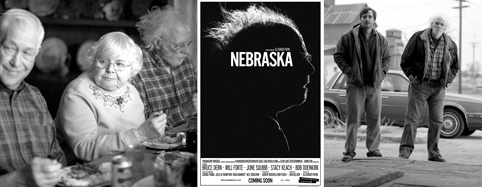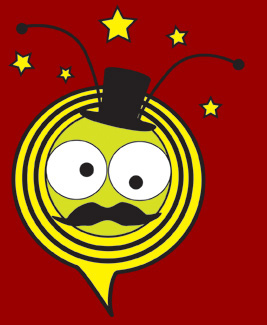
 D
DThe story of a delusional man badly in need of a comb, Nebraska touches on a lot of truths in a beautifully pared down way. Woody Grant, played by Bruce Dern (who is apparently a legend, but was previously only known to me as Father of Laura Dern), is an aging husband and father of two who latches on to the idea that he has won a Publishers Clearinghouse-like sweepstakes. The movie begins with Woody walking down a highway, the start of a trek from Montana to Nebraska to claim the bogus prize. Once his son, David, picks him up on the side of the road, a father-son road trip is set in motion, despite the derision of Woody's wife Kate, June Squibb as Character with the Kookiest Lines.
Woody and David find themselves in the town where Woody grew up and where most of their extended family still resides. Despite David's urgings to keep the fake lottery winnings a secret, Woody gets all braggy and everyone's ugliness comes out. A former friend turned rival tries to claim a portion of the money as his, all but threatening David if things don't go his way. Don't worry; punches may eventually be thrown.
The film picks up a little steam when an impromptu Grant Family Reunion ensues. A scene with all of the men sitting in front of the television, drinking cheap beer, and half-assedly making small talk without looking at each other is humorously and painfully familiar. These family scenes uncomfortably capture the awkward realization that just because someone's related to you by blood doesn't guarantee that you'll ever have any meaningful connection with them. Once the family brings up the topic of their fair shares of Woody's winnings, it becomes plain that, despite the verbal abuse she spits at him, Kate is aggressively loyal to her husband. Don't mess with her family; she's literally not afraid to show her ass.
Nebraska is an enjoyable, if somewhat forgettable, film that subtly inspires thoughts about the meaning of home and family and what's ultimately truly important to each of us. It also serves as a defense of that old adage, "You can never go home again."
7/10 Z
ZAlexander Payne's Nebraska tells the story of Woody Grant, a crotchety older gentleman who, upon receiving word that he's won a million dollars in a Publishers Clearing House-esque sweepstakes, decides to travel to Lincoln, Nebraska to claim his winnings. As a makeshift chaperone, Woody's son David escorts him on the trip, which takes them through Woody's hometown of Hawthorne, Nebraska. Joined later by Woody's equally crotchety wife Kate, Hawthorne is proverbially turned upside down by the news of Woody's fortune as family and friends alike come out of the woodwork to lay claim to Woody's winnings. At the heart of the story lies the question of the legitimacy of whether or not Woody has actually won anything at all, or has instead fallen victim to a marketing scheme that seeks to make victims of people who are naÏve enough to believe that millionaires are actually made out of these schemes.
I can truly understand Woody's plight. As a kid, the arrival of the Publisher's Clearing House mailings at our house was enough entertainment to sustain me for an entire day. The mailings came with bright, perforated stickers featuring the names of various magazine publications which I could subscribe in the interim of waiting for Ed McMahon to show up at our door with a large cardboard check. The stickers made their way onto Golden books that told the tale of a hungry lion that hunted an obese elephant that Walt Disney Magazine'd on an African plain while Cooks Monthly TV Guided on an airplane in North Highlights for Children. My parents once won a few cookbooks from PCH before I was born, and holding the cookbooks in my hand offered a glimpse into a world of what it meant to be a winner. It was only a matter of time before we won the big prize and could get whatever kind of cereal we wanted at the store.
Nebraska is a beautiful film. The choice to film in black and white is an inspired one, as we join Woody and David on their road trip through the Great Plains. Bruce Dern plays Woody in an incredibly honest way, highlighting the distance and unsympathetic quality that I find in my own father (and I wonder, in fact, if these qualities aren't almost universal). Watching Bruce Dern traverse various red carpets during awards season always makes me a little uncomfortable, as it's so easy to imagine that it's Woody instead, lost in a sea of celebrity and attention. Will Forte works as David, but rarely does more than that. For the most part, Woody steamrolls any motivation David may have to stop their trip or connect as a father and son team. While the performance is convincing, at best, the character is a little underdeveloped, and Forte never seems to make heads or tails of it. Much has been made of June Squibb's performance as Kate, which I have little more to add to than to say it's really neat to hear old people say offensive things, but... does this really make a performance Oscar worthy? Outside of Dern's turn, my favorite performance probably belongs to Angela McEwan, who plays Woody's ex-girlfriend Peggy, a simple woman living a simple life as a newspaper writer and editor in Hawthorne. Given the task of writing a story about Woody's good fortune, she takes the opportunity to tell David a little bit more about what his Dad means to the town. It's a soft, kind moment between two soft, kind people, in the midst of a world of personal indifference.
I didn't much care for Alexander Payne's The Descendants, a big Oscar draw a couple of years ago. I didn't really enjoy the world that Payne created in that film, and I didn't particularly identify with the people he populated it with. Nebraska offers a terrific return to form for the director who National Geographic's us with Life magazine and Redbook.
8/10 B
BNebraska is the sentimental tale of an old man named Woody, played by Bruce Dern, who believes he has won a million dollars from a marketing sweepstakes he receives in the mail. In an attempt to spend some more quality time with his aging father, Woody's son David, played by Will Forte, decides he will take Woody on a road trip to Lincoln, Nebraska to collect the prize money. Director Alexander Payne has a marvelous way of using setting to inform a story and using a story to give specific character to a place. He has done this before with California's Napa Valley in Sideways and with the Hawaiian islands in The Descendants. Nebraska is no exception. It seems that Payne is going state by state creating little cinematic American vignettes.
Sometimes this film feels amateur, however. Though Bruce Dern and Bob Odenkirk are magnificent here, the rest of the cast feels like they are acting for a student film. This feeling is amplified by the subpar film and sound quality. The use of high definition digital filming in black and white is an interesting choice. This method mostly works well with certain still shots that transform drab, unassuming landscapes and unkempt, barren small-town streets into timeless and romantic works of art. We also get great detail in the wrinkles and wispy hairs of the elderly. This all plays very nicely with themes of nostalgia, making new memories, and beauty in the ordinary and familiar. However, in motion, the cinematography comes off a little cheap and gimmicky at times.
June Squibb has somehow charmed everyone into believing she is great in this film. Actually, she is just given the character of Woody's wife who is a bit raunchy and crude at times. People just love to see a little old helpless lady act tough and crass. Honestly, there are many other elderly actresses that would have played the role better without just spitting out lines nonchalantly and with minimal credibility.
As charming as the film can be at moments, the overall story gets rather dull and depressing. It just doesn't feel like there's quite enough substance or quality acting here to be a great film.
6/10
